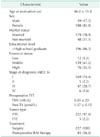1. Kilfoy BA, Zheng T, Holford TR, Han X, Ward MH, Sjodin A, et al. International patterns and trends in thyroid cancer incidence, 1973-2002. Cancer Causes Control. 2009; 20:525–531.
2. The Korea Central Cancer Registry, National Cancer Center. Annual report of cancer statistics in Korea in 2011. Goyang: National Cancer Center;2013.
3. Lee JI, Kim SH, Tan AH, Kim HK, Jang HW, Hur KY, et al. Decreased healthrelated quality of life in disease-free survivors of differentiated thyroid cancer in Korea. Health Qual Life Outcomes. 2010; 8:101.
4. Husson O, Haak HR, Buffart LM, Nieuwlaat WA, Oranje WA, Mols F, et al. Health-related quality of life and disease specific symptoms in long-term thyroid cancer survivors: a study from the population-based PROFILES registry. Acta Oncol. 2013; 52:249–258.
5. Husson O, Haak HR, Mols F, Nieuwenhuijzen GA, Nieuwlaat WA, Reemst PH, et al. Development of a disease-specific health-related quality of life questionnaire (THYCA-QoL) for thyroid cancer survivors. Acta Oncol. 2013; 52:447–454.
6. Yun YH, Park YS, Lee ES, Bang SM, Heo DS, Park SY, et al. Validation of the Korean version of the EORTC QLQ-C30. Qual Life Res. 2004; 13:863–868.
7. Dewolf L, Koller M, Velikova G, Johnson C, Scott N, Botomley A. on behalf of the EORTC Quality of Life Study Group. Quality of Life study group translation procedure. 3rd ed. Brussels: EORTC;2009.
8. Vachalec S, Bjordal K, Bottomley A, Blazeby J, Flechtner H, Ruyskart P. on behalf of the EORTC Quality of Life Study Group. EORTC item bank guidelines. Brussels: EORTC;2001.
9. Johnson C, Aaronson N, Blazeby JM, Bottomley A, Fayers P, Koller M, et al. Guidelines for developing questionnaire modules. 4th ed. Brussels: EORTC;2011.
10. Fayers PM, Aaronson NK, Bjordal K, Groenvold M, Curran D, Bottomley A, et al. EORTC QLQ-C30 scoring manual. 3rd ed. Brussels: EORTC;2001.
11. Aaronson NK, Ahmedzai S, Bergman B, Bullinger M, Cull A, Duez NJ, et al. The European Organization for Research and Treatment of Cancer QLQ-C30: a qualityof-life instrument for use in international clinical trials in oncology. J Natl Cancer Inst. 1993; 85:365–376.
12. Yun YH, Wang XS, Lee JS, Roh JW, Lee CG, Lee WS, et al. Validation study of the korean version of the brief fatigue inventory. J Pain Symptom Manage. 2005; 29:165–172.
13. Im JH, Bae JM, Choi SS, Kim SW, Hwang HS, Hur BR. The validity of modified Korean-translated BEPSI (brief encounter psychosocial instrument) as instrument of stress measurement in outpatient clinic. J Korean Acad Fam Med. 1996; 17:42–49.
14. Frank SH, Zyzanski SJ. Stress in the clinical setting: the Brief Encounter Psychosocial Instrument. J Fam Pract. 1988; 26:533–539.
15. Kim JS, Kim YS, Lee GY, Park TJ, Lee YH, Kong BK, et al. The standardization of Korean-translated Goldberg's shart screening scale for Anxiety and Depression. J Korean Acad Fam Med. 1997; 18:1452–1460.
16. Goldberg D, Bridges K, Duncan-Jones P, Grayson D. Detecting anxiety and depression in general medical settings. BMJ. 1988; 297:897–899.
17. Arroll B, Goodyear-Smith F, Crengle S, Gunn J, Kerse N, Fishman T, et al. Validation of PHQ-2 and PHQ-9 to screen for major depression in the primary care population. Ann Fam Med. 2010; 8:348–353.
18. Aaronson N, Alonso J, Burnam A, Lohr KN, Patrick DL, Perrin E, et al. Assessing health status and quality-oflife instruments: attributes and review criteria. Qual Life Res. 2002; 11:193–205.
19. Terwee CB, Bot SD, de Boer MR, van der Windt DA, Knol DL, Dekker J, et al. Quality criteria were proposed for measurement properties of health status questionnaires. J Clin Epidemiol. 2007; 60:34–42.
20. Yun YH, Mendoza TR, Kang IO, You CH, Roh JW, Lee CG, et al. Validation study of the Korean version of the M.D. Anderson Symptom Inventory. J Pain Symptom Manage. 2006; 31:345–352.
21. Nunnally J. Psychometric theory. New York: McGraw-Hill;1994.
22. Shin YS, Kim JH. Validation of the Korean version of the European Organization for Research and Treatment of Cancer brain cancer module (EORTC QLQ-BN20) in patients with brain tumors. Health Qual Life Outcomes. 2013; 11:145.
23. Boyle GJ. Does item homogeneity indicate internal consistency or item redundancy in psychometric scales? Personal Individ Differ. 1991; 12:291–294.
24. Jenkins GD, Taber TD. A Monte Carlo study of factors affecting three indices of composite scale reliability. J Appl Psychol. 1976; 62:392–398.
25. McCrae RR, Kurtz JE, Yamagata S, Terracciano A. Internal consistency, retest reliability, and their implications for personality scale validity. Pers Soc Psychol Rev. 2011; 15:28–50.
26. Marx RG, Bombardier C, Hogg-Johnson S, Wright JG. Clinimetric and psychometric strategies for development of a health measurement scale. J Clin Epidemiol. 1999; 52:105–111.






 PDF
PDF ePub
ePub Citation
Citation Print
Print




 XML Download
XML Download